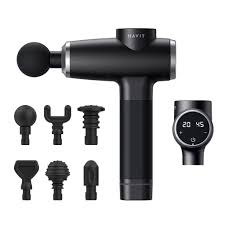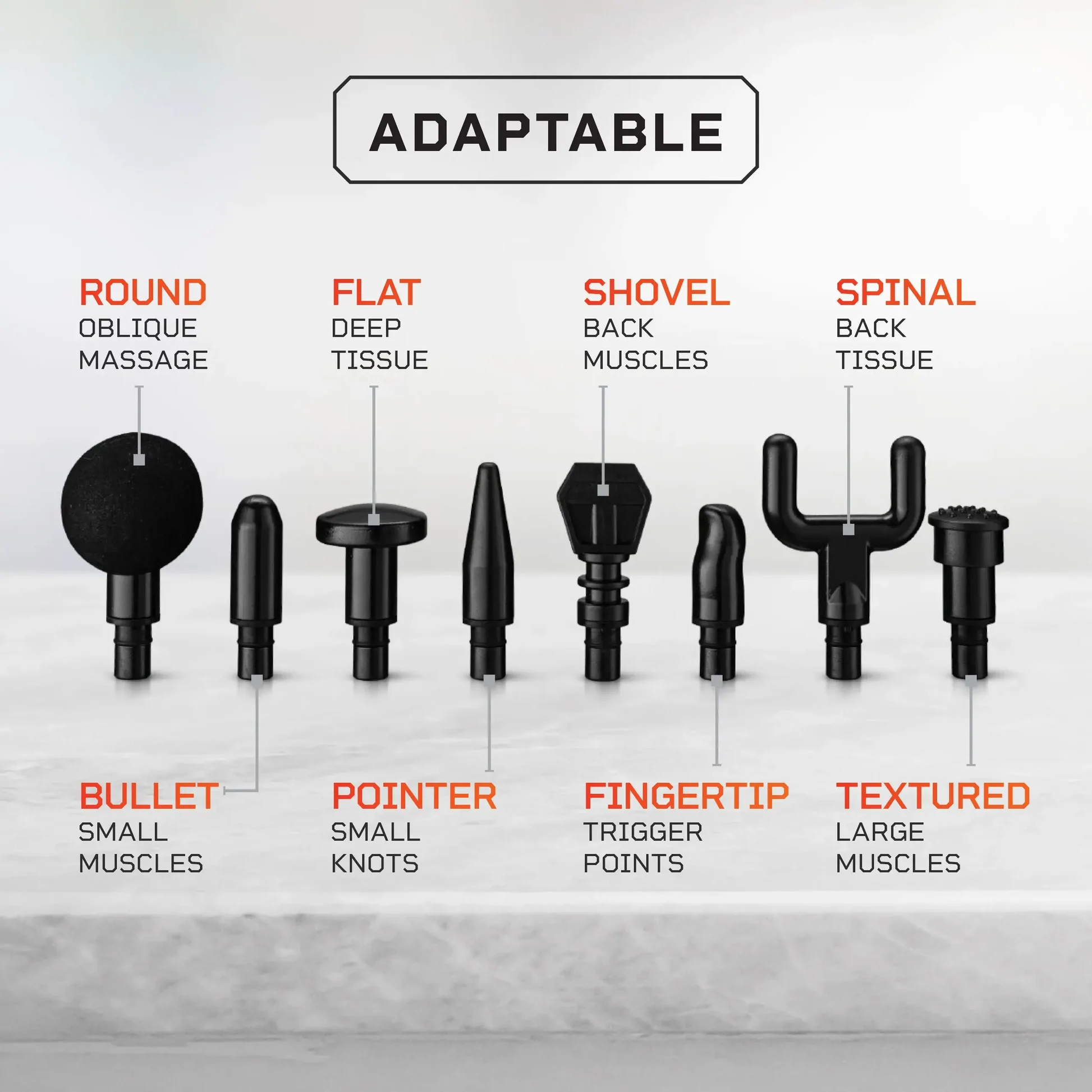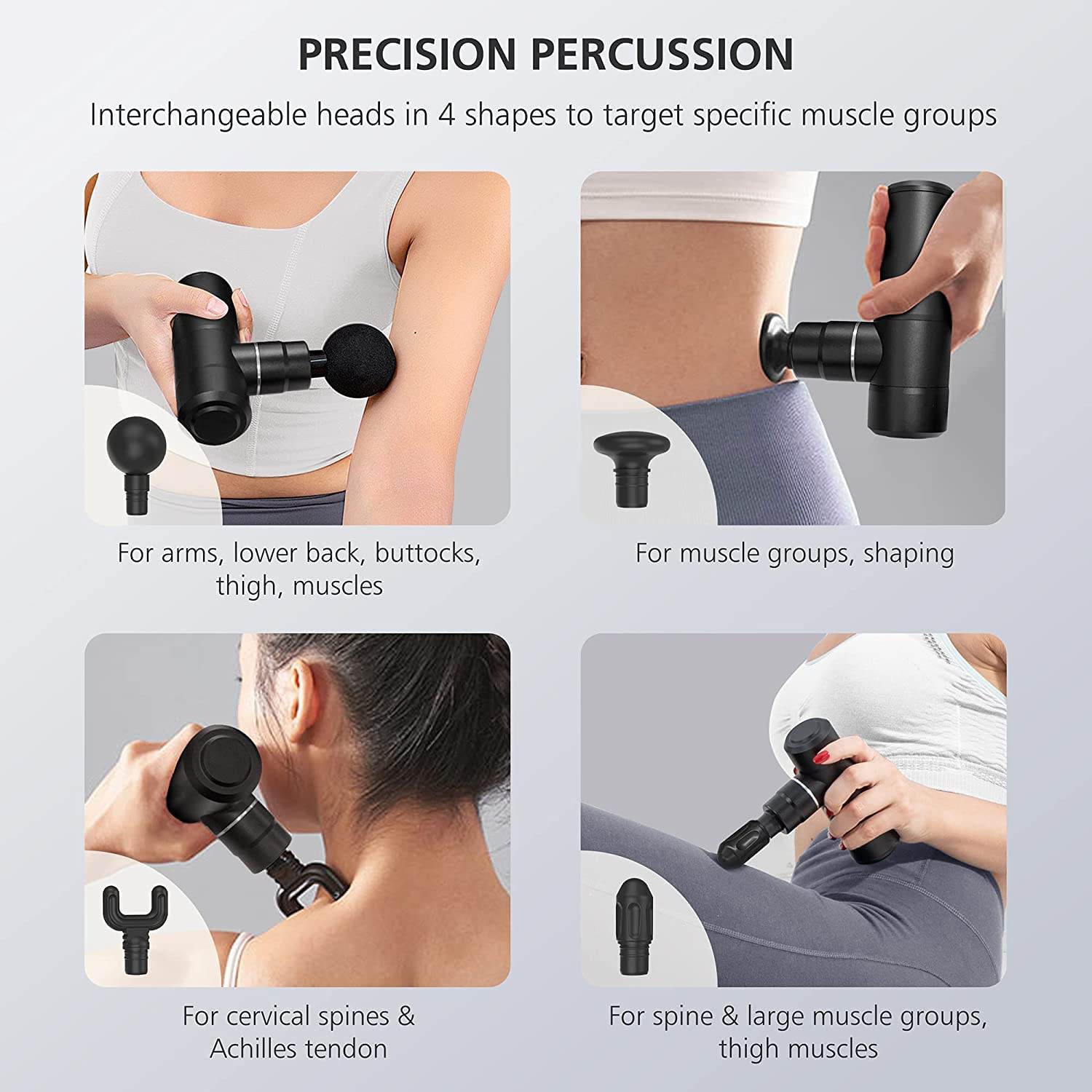Unleash the Power of Self-Care: Your Ultimate Massage Gun Attachment Guide with Video Instructions from a Licensed Physical Therapist
Have you seen a chiropractor or a physical therapist using a massage gun on patients and wondered what all of those attachments are for? In the comprehensive massage gun attachment guide, we will answer all of your questions.
Most massage guns come with a variation of 5 attachments that are used for different situations. But, with all the attachments, it's hard to know how and where to use a massage gun. With balls, flat heads, bullets, and forks… there are a lot of attachments. Which body part to use them on is another matter.
So before you power on your massage gun, use this guide to learn how to use it. Some of the uncommonly known massage gun benefits are also included. Of course, having a high-quality massage gun makes a world of difference. Read the “Ekrin B37 Massage Gun Review” to learn about one of the best.
Massage Gun Attachment Uses - Instructional Video with Dr. Steph Dorworth
While similar to a traditional massager, massage guns have a few differences and are usually used when more power is required. One of the great things about this device is that it’s very easy to use. When used right, a massage gun can be as effective as visiting a massage therapist. This article takes a quick look at how to use a massage gun and a more thorough look at directions for specific body parts.
After choosing your attachment, you’ll want to turn the massager on while it’s not touching your body to ensure you have as much control as possible. Next, you’ll need to put the massage gun on the area that needs massaging while making sure you aren’t applying any pressure. Let the massager slide across the muscle and move about an inch at a time.
If you come across a knot or stiff area, let the massager sit in that spot until you start to feel relief. Go over the muscle as many times as needed and let the massager do the work. Keep in mind, never use the massage gun directly on the joints or bones.
In addition to understanding how a massage gun works, it’s also important to know what kinds of massage heads are available and what some of the benefits are. This article may also help answer a few frequently asked questions.
Massage Gun Attachment Guide - Massage Gun Heads Explained

Most massage guns have several attachment options, which can be better for certain situations. The most common attachments are listed below in this short guide, as well as how they are used best.
Large Ball
This is the most common, softest, and most flexible of all attachments. It’s mainly used to treat medium or large muscle groups and can be used for most parts of the body. Depending on the manufacturer, it's made of either a dense rubber or hardened foam. The padding offers a little "give," so if you hit your wrist bone, you won't feel the pain you would with a hard attachment. Since it has the padding, you can use this massage gun attachment around bony areas like the spine, shoulder, wrists, feet, and upper neck. The exact size will differ from manufacturer to manufacturer but should be big enough to massage multiple large muscle groups at once. If you’re looking for a go to attachment for sensitive muscle groups and bony areas, we recommend the large ball because it is the most versatile attachment and is very easy to use.
Small Ball
The small ball attachment is just like the large ball with the exception of size. This attachment is much smaller than the large ball and is most commonly used with medium or small sensitive muscle groups. While it can only massage small or medium areas at a time, it works exactly the same as the large ball attachment and is made with the same types of materials. This is the best option if you’re looking for something for general or occasional use.
Flat Head
The flat round attachment is perfect for minor or smaller muscle groups as well as relaxatation and full body massage. The flathead attachment is also great for shoulder blades. It is most commonly used when a deeper or more dense massage is needed. A great thing about the flat head attachment is that there aren’t any sharp or pointy edges, which means you won’t feel as much pain if you go over areas with a lot of bone or if you need a full body massage. Depending on which company you use, you might find flat head attachments in several different sizes.
The Fork
The fork attachment is one that won’t be used by the majority of people, but it’s great for larger muscle groups such as quads, hamstrings, and glutes because it provides more coverage than other attachments. It is also great for those that deal with chronic back pain or tension. It’s designed to go on each side of the spine and massage both areas at once. It is recommended to massage larger muscle groups for 2 minutes. This fork attachment can also be used to speed up recovery time and in the lower back or tailbone area to help relieve any tension that has built-up. Keep in mind, this can be used safely around the spine, but shouldn’t be used right on the bone.
The Bullet
The final attachment to look at is the bullet head. It’s small in size and comes to a gentle point at the top. It’s mostly used for targeting smaller muscle groups, such as the hands and feet, and also works well for any spot that needs a deep tissue massage. This makes this massage gun attachmentideal for trigger point massage with a deep effect. With the bullet head, it's really easy to pinpoint tough areas and activate deep tissue. It's one of the most useful attachments.
Since it’s used to massage specific areas, it shouldn’t be used for longer than 15 seconds per muscle area at a time. As with the other attachments, some companies will offer several different size options, but they all should work for targeted massaging.
How to Use Massage Gun by Body Part

It’s also important to know how to use a massage gun attachment based on where you’re having muscle pain. A massage gun can be used on multiple different body parts, but the ones listed below are the most common.
Neck
Since massage guns are very powerful, you want to be cautious when using it for your neck. After turning the device on, you’ll want to hold it on the spots that are tense or knotted. After holding it there for around 10 seconds, move the massage gun up, down, left, and right. Try and be as relaxed as possible to reduce straining or injury. Overall, you should spend around 2 minutes massaging this area.
Back
Using this device when you feel pain or stiffness in your lower back can provide quite a bit of relief. You’ll want to start at the top of your lower back and slowly make your way down. Depending on your preferences, you can continue traveling down and give your glutes a massage as well. When you get to your spine in this area, you’ll want to make sure you stay on either side. If possible, add in a little motion going left and right to help ensure you’re reaching your quadratus lumborum, or QL, muscles. This area usually does well with around 2 minutes of massage.
Shoulders
The shoulders have several different muscle groups and it’s important to try and hit them all while using a massage gun. With this area, you might need to change the attachments for different muscle groups. You’ll want to start at the top of your shoulders and work down, making sure you’re extending your forearm with your thumb facing upwards. Make sure you also massage underneath your armpit, as well as your deltoid muscles. You’ll want to work in this area for up to 2 minutes.
Inner Thighs
Many times, people tend to forget to massage their inner thigh muscles and lose out on the benefits that come with that. To start with, you’ll want to position your massage gun on the inside of your hip at the pubic bone. Slowly work your way down until you get to the area just above the knee. Once you hit that spot, you can start moving back up. You should try to massage this group of muscles for around 2 minutes.
Calves
The final area to talk about is the calves, which is an area that’s often forgotten. Most people don’t realize how much you use your calves and the beating they take. The best way to use a massage gun for your calves is to get into a seated position with your ankle over your opposite knee. You’ll want to spend around 2 minutes on this area and slowly work your way up and down.
Massage Gun Benefits
Massage guns have several benefits and can be an awesome tool when used correctly. If you still aren’t sure whether or not you should use a massage gun, consider some of the benefits we listed below.
Powerful
Massage guns are quite a bit more powerful than traditional massagers, which can give you better results. You can have more relief in a shorter amount of time and there are attachments that are great for multiple different areas of the body. If you’re looking for something that can give you great results in a short amount of time, then a massage gun could be the best device for your needs.
Quicker Recovery
Another benefit of a massage gun is that it can allow you to recover more quickly. While this won’t be the case with everyone, many people find that they get better results after injury by using a massage gun as opposed to a traditional massager. You’ll want to use the massage gun frequently for no longer than around 2 minutes for each muscle area.
Increased Range of Motion
Since a massage gun has so much power and several different attachments to choose from, you can get your range of motion back. Some of the attachments are created to target smaller areas, which is something that can greatly help you with getting your range of motion back. Remember, talk to your doctor before using, especially if you’re healing or trying to improve your muscles after an injury.
Increases Blood Flow
You’ll also be able to get increased blood flow in the areas where you use the massage gun, as well as areas that are closely connected. The main reason for this is because there aren’t any knots or stiffness that’s preventing how much blood can flow through that area. Having increased blood flow can give you a bunch of other benefits, including longer exercise times, easier recoveries, and a lower risk of developing certain health conditions.
Spasm & Stiffness Relief
If you’ve experienced stiffness or spasms, then you know how painful they are. Using a massage gun regularly can help give you relief from muscle knots, stiffness, and muscle spasms, as well as helping you recover quicker if you experience them. If you happen to be near your massager, you can use it when the spasm starts. This should help the spasm stop quicker and you should find that it’s not quite as painful as usual.
Scar Tissue Breakage
One final benefit of using massage guns is that it can help break-up scar tissue. This is great for those that have had previous injuries or a lot of built-up scar tissue. Scar tissue is a big reason for a lot of pain and discomfort, so you should be able to feel relief as the tissue is getting broken up. Since your doctor might not want you to try this, you’ll want to consult them first before using the massage gun for this purpose.
FAQ
Use the answers below for some of the most commonly asked questions about massage guns.
Which attachments do I need for my massage gun?
How do I choose a massage gun?
How expensive is a massage gun?
Should I consult my doctor before using a massage gun?
What happens if I don’t get relief from my massage gun?
Conclusion

Now that you know how to use a massage gun by attachment type and the targeted areas, make sure you have your desired massage head attached and power it up! Experiment with different types of movement, both along and across muscle fibers, and see what feels best to you.
Beyond athletic recovery, it’s great for any relief, even therapeutic. Also, keeping your massage gun properly charged is critical. Keep in mind that if you want a good massage gun, you may want to save up at least $150. While the price of some massage guns can seem intimidating, a quality one like the Ekrin B37 won’t lead you wrong. Whatever you choose, a massage gun is sure to become one of your favorite fitness tools.

